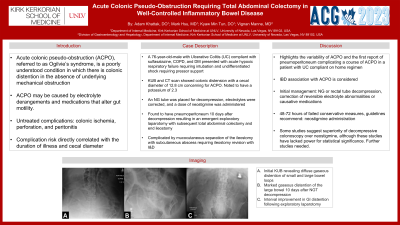Sunday Poster Session
Category: Colon
P0294 - Acute Colonic Pseudo-Obstruction Requiring Total Abdominal Colectomy in Well-Controlled Inflammatory Bowel Disease
Sunday, October 22, 2023
3:30 PM - 7:00 PM PT
Location: Exhibit Hall

Has Audio
.jpg)
Adam M. Khattak, DO
Kirk Kerkorian School of Medicine at UNLV
Las Vegas, NV
Presenting Author(s)
Adam Khattak, DO, Mark Hsu, MD, Kyaw Min Tun, DO, Vignan Manne, MD
Kirk Kerkorian School of Medicine at UNLV, Las Vegas, NV
Introduction: Acute colonic pseudo-obstruction (ACPO), referred to as Ogilvie’s syndrome, is a poorly understood condition in which there is colonic distention in the absence of underlying mechanical obstruction. ACPO may be caused by electrolyte derangements and medications that alter gut motility. Untreated ACPO can lead to devastating complications including colonic ischemia, perforation, and peritonitis. Complication risk increases directly with the duration of illness and cecal diameter. We present a case of a patient with a known history of ulcerative colitis who was found to have ACPO that failed medical therapy requiring exploratory laparotomy with subsequent total abdominal colectomy.
Case Description/Methods: A 76-year-old-male with ulcerative colitis compliant with sulfasalazine, COPD, and diabetes presented with acute hypoxic respiratory failure requiring intubation, with hospital course complicated by undifferentiated shock. KUB and CT scan a day after ICU admission showed colonic distension with a cecal diameter of 12.8 cm concerning for ACPO. Patient was noted to have a potassium of 2.3. An NG tube was placed for decompression, electrolytes were corrected, and one dose of neostigmine was administered on the day of imaging. Unfortunately, the patient was found to have pneumoperitoneum 10 days after decompression resulting in an emergent exploratory laparotomy with subsequent total abdominal colectomy and end ileostomy. This was complicated by mucocutaneous separation of the ileostomy with subcutaneous abscess requiring ileostomy revision with I&D. The patient was subsequently discharged to a group home.
Discussion: This case highlights the variability of ACPO and, to our knowledge, the first report of pneumoperitoneum complicating a course of ACPO in a patient with well-controlled ulcerative colitis. This informs the question of inflammatory bowel diseases’ association with ACPO in the setting of known compliance with home regimen. ACPO is initially managed with decompression with nasogastric or rectal tube, and correction of reversible triggers such as electrolyte abnormalities or causative medications. For those who have failed 48-72 hours of conservative measures, guidelines recommend neostigmine administration. However, some studies suggest superiority in efficacy of decompressive colonoscopy over neostigmine, although these studies have lacked power for statistical significance. Future studies clarifying the efficacy of neostigmine versus decompressive colonoscopy will be of importance.

Disclosures:
Adam Khattak, DO, Mark Hsu, MD, Kyaw Min Tun, DO, Vignan Manne, MD. P0294 - Acute Colonic Pseudo-Obstruction Requiring Total Abdominal Colectomy in Well-Controlled Inflammatory Bowel Disease, ACG 2023 Annual Scientific Meeting Abstracts. Vancouver, BC, Canada: American College of Gastroenterology.
Kirk Kerkorian School of Medicine at UNLV, Las Vegas, NV
Introduction: Acute colonic pseudo-obstruction (ACPO), referred to as Ogilvie’s syndrome, is a poorly understood condition in which there is colonic distention in the absence of underlying mechanical obstruction. ACPO may be caused by electrolyte derangements and medications that alter gut motility. Untreated ACPO can lead to devastating complications including colonic ischemia, perforation, and peritonitis. Complication risk increases directly with the duration of illness and cecal diameter. We present a case of a patient with a known history of ulcerative colitis who was found to have ACPO that failed medical therapy requiring exploratory laparotomy with subsequent total abdominal colectomy.
Case Description/Methods: A 76-year-old-male with ulcerative colitis compliant with sulfasalazine, COPD, and diabetes presented with acute hypoxic respiratory failure requiring intubation, with hospital course complicated by undifferentiated shock. KUB and CT scan a day after ICU admission showed colonic distension with a cecal diameter of 12.8 cm concerning for ACPO. Patient was noted to have a potassium of 2.3. An NG tube was placed for decompression, electrolytes were corrected, and one dose of neostigmine was administered on the day of imaging. Unfortunately, the patient was found to have pneumoperitoneum 10 days after decompression resulting in an emergent exploratory laparotomy with subsequent total abdominal colectomy and end ileostomy. This was complicated by mucocutaneous separation of the ileostomy with subcutaneous abscess requiring ileostomy revision with I&D. The patient was subsequently discharged to a group home.
Discussion: This case highlights the variability of ACPO and, to our knowledge, the first report of pneumoperitoneum complicating a course of ACPO in a patient with well-controlled ulcerative colitis. This informs the question of inflammatory bowel diseases’ association with ACPO in the setting of known compliance with home regimen. ACPO is initially managed with decompression with nasogastric or rectal tube, and correction of reversible triggers such as electrolyte abnormalities or causative medications. For those who have failed 48-72 hours of conservative measures, guidelines recommend neostigmine administration. However, some studies suggest superiority in efficacy of decompressive colonoscopy over neostigmine, although these studies have lacked power for statistical significance. Future studies clarifying the efficacy of neostigmine versus decompressive colonoscopy will be of importance.

Figure: A- Initial KUB revealing diffuse gaseous distention of small and large bowel loops; B- Marked gaseous distention of the large bowel 10 days after NGT decompression; C- Interval improvement in GI distention following exploratory laparotomy
Disclosures:
Adam Khattak indicated no relevant financial relationships.
Mark Hsu indicated no relevant financial relationships.
Kyaw Min Tun indicated no relevant financial relationships.
Vignan Manne indicated no relevant financial relationships.
Adam Khattak, DO, Mark Hsu, MD, Kyaw Min Tun, DO, Vignan Manne, MD. P0294 - Acute Colonic Pseudo-Obstruction Requiring Total Abdominal Colectomy in Well-Controlled Inflammatory Bowel Disease, ACG 2023 Annual Scientific Meeting Abstracts. Vancouver, BC, Canada: American College of Gastroenterology.
